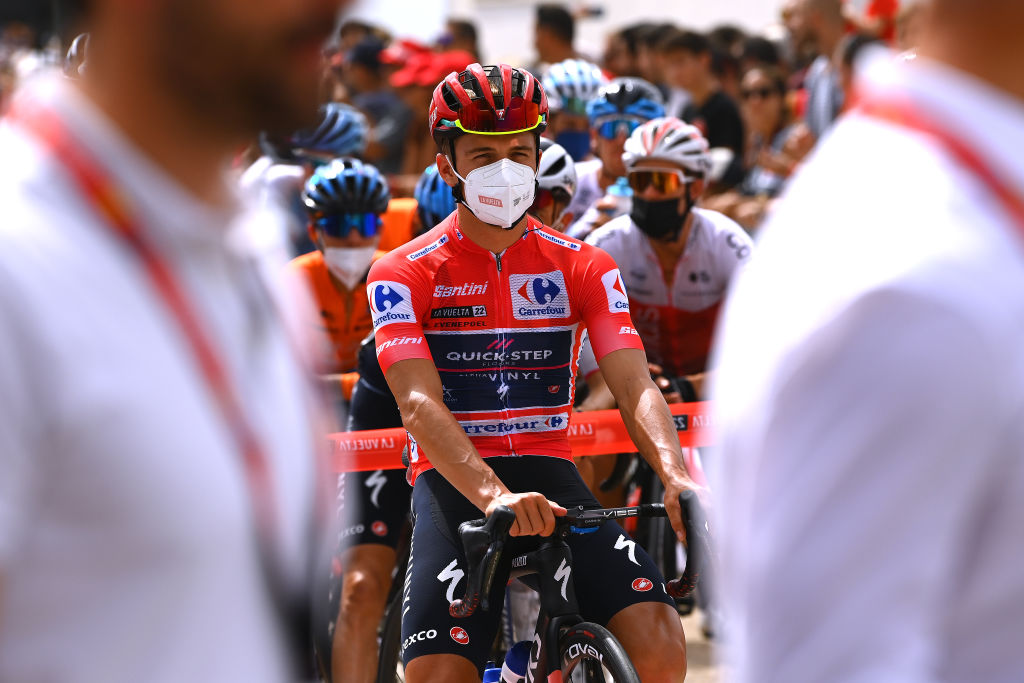Remco Evenepoel: ‘Risky’ for Ayuso to stay in Vuelta a España with COVID-19
Belgian untroubled by crash injuries on the road to Montilla

For Remco Evenepoel, positioning seemed to be just as big a consideration at the start of stage 13 of the Vuelta a España as it was in the closing kilometres.
Shortly before the peloton set out from Ronda, UAE Team Emirates announced that Juan Ayuso had tested positive for COVID-19, but his low viral load meant he could remain in the race as he was deemed not to be contagious.
The leaders of the Vuelta classifications ordinarily line up alongside one another at the head of the field, but on Friday, Evenepoel felt it would be sage to maintain a certain distance from the man currently wearing the white jersey on his behalf.
“I’m going to stay far away from him at the start,” Evenepoel said in the mixed zone. “I think it’s risky. There is a good chance that he will still give up because corona slowly builds up in the body.
“It's not up to me to say anything about it. It's nice for him that he feels better. But I would advise him to think carefully about it, as he could be seriously ill within a few days. That's how it went for my teammate Pieter Serry.”
Evenepoel briefly revisited the topic after reaching the finish in Montilla safely in the main body of the peloton, noting that it was “a bit bizarre” that riders were choosing to continue in the Vuelta despite testing positive for COVID-19.
As anticipated, stage 13 concluded in a bunch sprint, with Mads Pedersen (Trek-Segafredo) emerging victorious on the uphill finale in Montilla. Evenepoel was safely tucked near the head of the peloton on the run-in before drifting back, though Primož Roglič (Jumbo-Visma) – second overall at 2:41 – briefly looked to be considering a crack at the sprint.
Get The Leadout Newsletter
The latest race content, interviews, features, reviews and expert buying guides, direct to your inbox!
“I don’t know what he did. Maybe he wanted to make a gap or win the stage, I actually didn’t see what happened in front of me,” said Evenepoel. “I just wanted to enter the last kilometre in a good position, and I managed to do well. The team dropped me off with 3k to go and then I was looking for my own position. It was actually something I learned from leading out Fabio [Jakobsen] at the beginning of the season. It was quite easy to find my way in the bunch.”
Everything has seemed to come easily to Evenepoel so far on the Vuelta, though he had endured a brace of setbacks over the previous two stages. After losing QuickStep-AlphaVinyl teammate Julian Alaphilippe to a crash on Wednesday, Evenepoel was himself a faller on stage 12. He shook off that incident to lead the GC contenders home at the finish atop Peñas Blancas, and he reported few lingering effects following Friday’s stage.
“It could be a bit better, but it was fine, not a big problem,” said Evenepoel, who made a rare outing in gloves on the road to Montilla following his crash. “I think tomorrow I will not wear them again. They were annoying me quite a bit during the stage.”
The Vuelta’s third weekend brings another doubleheader of mountaintop finishes, with Saturday’s finale atop La Pandera followed by the haul to Sierra Nevada on stage 15. Evenepoel has dealt comfortably with the summit finishes of the Vuelta so far, distancing his rivals at Pico Jano and Les Praeres, and controlling from the front at Colláu Fancuaya and Peñas Blancas. On the evidence to this point, the maillot rojo will be heavily favoured to maintain his advantage by the time the Vuelta pauses for its third and final rest day on Monday.
“The climbs aren’t the hardest, especially on Saturday. Ten kilometres at 5%, then eight kilometres at 5%, or something like that. The danger is more the length of the climbs, as well as the heat and the fatigue. These are the things that will decide the result,” said Evenepoel.
“I feel good, and the team is very motivated. We know it would already be a lot if we get through this weekend with the same advantage on our rivals as we have now. We’ll try not to lose time and, if it’s possible, to gain a little more. But it’s not necessary. It’s a bit like Thursday. If they attack me and I can control the last 2km, that’s perfect.”

Barry Ryan was Head of Features at Cyclingnews. He has covered professional cycling since 2010, reporting from the Tour de France, Giro d’Italia and events from Argentina to Japan. His writing has appeared in The Independent, Procycling and Cycling Plus. He is the author of The Ascent: Sean Kelly, Stephen Roche and the Rise of Irish Cycling’s Golden Generation, published by Gill Books.